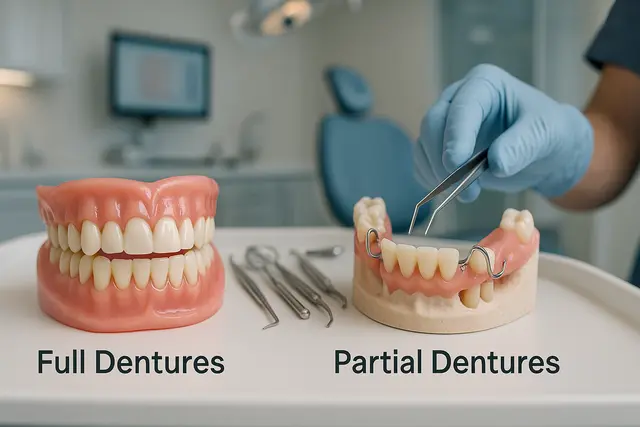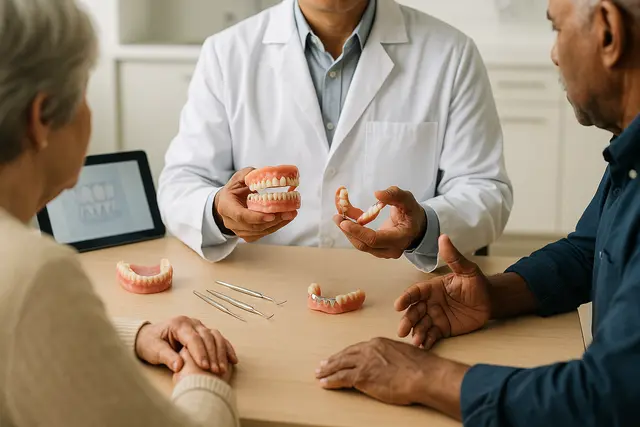Prosthodontics
5 min read
Nov 03, 2025
Partial Dentures vs. Full Dentures Comparison: What Works Best for Your Situation
Choosing between partial and full dentures is an important step in restoring both your smile and confidence. With each option designed to meet different dental needs, understanding their differences can help you make the right decision for your oral health and lifestyle.

When you’re missing teeth, whether it’s just a few or all of them, the impact goes far beyond your smile. Eating, speaking, and even your confidence can take a hit. That’s where dentures come in, a tried-and-true solution for restoring your smile and getting your life back on track. But with so many options, one big question stands out: Should you go with partial dentures or full dentures?
Let’s break it down in a clear, practical way to help you figure out which denture is right for your unique needs.
Understanding Full Dentures
Full dentures are used when all teeth in the upper or lower jaw (or both) are missing. These dentures replace an entire arch, whether it’s the teeth in the upper jaw, lower jaw, or both. Traditional full dentures are designed to sit on your gums, molded to fit your mouth exactly. They’re custom-made for a reason, no two smiles are the same.
Full dentures can take a little time to get used to, but they’re a reliable option when you’ve lost many teeth and need to restore your smile completely. Whether you choose full dentures immediately after extractions or after healing, the goal is the same: give you back function and confidence.
The Partial Denture Difference
Now, if you still have some natural teeth that are healthy and worth saving, a partial denture may be the better choice. These are removable appliances that fill in the gaps left by missing teeth, anchoring to your existing teeth to stay secure. A partial can replace one tooth or several, depending on the number of teeth you’re missing.
Partial dentures are designed to blend in with your smile while preventing natural teeth from shifting. In other words, they’re not just filling space, they’re helping preserve the rest of your smile too.
Full Dentures and Partial Dentures Comparison That Matters
Between full and partial dentures, the real difference depends on your situation. If you have no teeth left, complete dentures are designed for you. But if you still have remaining teeth that are healthy, partial dentures often make more sense.
Here’s a quick overview:
Full dentures are ideal for total tooth loss.
Partial dentures are a great fit when some natural teeth remain.
Partial dentures often include metal clasps or flexible materials that anchor them securely.
Full dentures may use suction or adhesives for stability.
Choosing Between Full Dentures and Partial Dentures
Choosing between full and partial really comes down to the condition of your teeth. Are there still teeth in your upper or lower jaw that are strong and healthy? If so, a partial could help you keep them longer. If not, it might be time to go for complete dentures.
Your dentist will evaluate your oral health, talk through your goals, and walk you through the best denture option for your lifestyle.
Dentures and Partial Dentures Fit and Function
A big concern for anyone considering dentures is comfort and function. You want dentures that fit well, don’t slip when you talk, and let you eat a meal without worry. Good news, dentures are custom-made to fit the shape of your mouth, and with a bit of time and adjustment, most people adapt well.
Partial dentures may feel more natural at first, especially since they work with your existing teeth. They’re also usually more stable than full dentures because they latch onto remaining teeth.
Restore Your Smile Without Sacrificing Comfort
Both full and partial dentures aim to restore your smile, but they do it in slightly different ways. Think of complete and partial dentures as tools, each has its place, depending on what you need.
And if you’ve been losing teeth over time, it can feel discouraging. But the truth is, dentures can restore not just how you look, but how you feel. They help you chew better, speak clearly, and smile with ease. That emotional impact is huge.
What’s the Difference Between Full vs Partial
When comparing full vs partial, the most obvious contrast is in how much of your smile they replace. Complete dentures replace a whole arch. Partial dentures replace only the missing teeth, using the rest of your natural teeth for support.
You’ll also find that partial dentures often feel more lightweight and take less time to get used to. But they still need proper care and cleaning just like full ones.
Considering Getting Dentures Soon
If you’re considering getting dentures, don’t wait. The longer teeth are missing, the more your oral health can decline. Dentures help preserve jawbone shape and prevent remaining teeth from shifting, especially with a well-fitted partial.
There’s also an option called an immediate denture, which can be placed the same day your teeth are removed. It helps you avoid being without teeth during healing. It’s not always perfect at first, but it can give you a major boost in comfort and confidence while waiting for your new dentures.
Benefits of Full Dentures for Complete Tooth Loss
There are real benefits of full dentures when you need a fresh start. They give you a new smile in one go and are often more affordable upfront than alternatives like dental implants.
That said, dental implants can also support both full or partial dentures, making them more secure. It’s a good conversation to have with your dentist, especially if you want something more permanent and stable.
Dentures Fit Your Life When Chosen Right
Whether full or partial dentures, the key is making sure they fit your lifestyle. If you enjoy food, talk a lot during work, or just want peace of mind socially, dentures that fit well make a massive difference.
Here are a few real-life tips:
Soak your dentures overnight to keep them clean and prevent warping.
Remove your dentures to sleep, letting your gums rest.
Care of your dentures daily with soft brushing and rinsing.
See your dentist regularly to keep dentures in excellent condition.
Choosing Between Full Dentures Takes Expert Guidance
Choosing between full dentures isn’t something you need to figure out alone. Your dentist will assess bone health, tooth condition, budget, and personal goals. They’ll help you choose the right solution, ensuring your denture is right not just for your mouth, but for your life.
Sometimes, dentures may not satisfy everyone and could be a short-term solution while you save for implants. Other times, partial dentures are used to help you hold onto healthy teeth as long as possible. No matter what, dentures are removable, affordable, and way more comfortable than you might think.
What Is the Difference Between Full Dentures and Partial Dentures?
Full dentures replace an entire arch of missing teeth in either the upper or lower jaw, resting directly on the gums using suction or adhesive for stability. Partial dentures, however, are used when some natural teeth remain, they anchor to healthy existing teeth to fill gaps and help maintain alignment. The choice depends on how many teeth you’ve lost and the health of those still present.
When Should I Choose Full Dentures Instead of Partial Dentures?
Full dentures are ideal when all teeth in a jaw need to be replaced due to decay, gum disease, or tooth loss over time. Partial dentures are better when you still have healthy teeth that can support the appliance. Your dentist will evaluate your remaining teeth and jaw health to recommend the most effective solution for comfort, function, and long-term oral health.
How Do Full and Partial Dentures Feel and Function?
Both types are custom-designed for comfort and function, but partial dentures often feel more natural at first since they anchor to existing teeth. Full dentures require a short adjustment period as they rely on gum support and proper fit. With time, both can help restore normal chewing, speech, and confidence, especially with proper care and regular adjustments.
How Do I Care for My Dentures to Ensure They Last?
Regardless of type, dentures require daily cleaning to prevent bacteria buildup and protect your gums. Remove and brush them gently, soak them overnight to maintain shape, and clean your gums and any remaining natural teeth daily. Regular dental check-ups are important to monitor fit and oral health, and adjustments may be needed as your mouth naturally changes over time.
Read Next
Related Posts

Prosthodontics
Differences Between Zirconia and Acrylic Dentures: Benefits, Drawbacks, and Tips
Choosing between zirconia and acrylic for dental implants can feel overwhelming, especially when both materials offer unique advantages. This guide breaks down the essential differences, benefits, and limitations of each option to help you make a more confident, informed decision about your dental restoration journey.
5 min read
Nov 03, 2025

Prosthodontics
Dentures vs. Partial Dentures Pros and Cons: Helping You Make the Best Choice
Tooth loss can impact everything from your self-confidence to your ability to enjoy your favorite foods. Fortunately, modern dentistry offers practical solutions that restore both function and aesthetics. Two of the most common options are full dentures and partial dentures, each with its own advantages and limitations.
5 min read
Nov 03, 2025

Prosthodontics
Full Dentures vs. Partials: Key Differences, Appearance, and Performance Compared
Choosing the right type of dentures can feel overwhelming, especially if you're unsure whether full or partial dentures are better suited for your needs. Understanding the differences between these two options is key to restoring your smile, comfort, and confidence. This article explores how full and partial dentures compare in terms of appearance, function, and overall fit.
6 min read
Nov 03, 2025
Don’t have time to research every dentist around you?
See why 30k+ patients trusted us